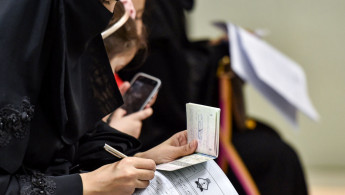Saudi Arabia: HRW calls on authorities to drop 'baseless investigation' against US citizen
Human Rights Watch (HRW) have urged Saudi Arabia to drop their "baseless investigation" against a US citizen who posted tweets criticising the kingdom’s male guardianship system.
Carly Morris now faces criminal charges for "disrupting the public order" after she slammed Saudi laws which she said restricted her ability to make critical decisions in her daughter’s life, such as access to travel, medical care and education.
The 34-year-old accused her ex-husband of confiscating her and her daughter’s passports, meaning she is stuck in Saudi Arabia and subjected to what she believes are punitive regulations on women’s rights.
The US citizen took to Twitter to share her current situation but later deleted the social media posts.
"The Saudi authorities are sending the message once again that anyone even criticising their draconian and discriminatory laws can be a target for arrest and prosecution," said Sarah Yager, Washington advocacy director at HRW.
Morris was persuaded by her ex-husband, a Saudi citizen, to visit the kingdom with her daughter Tala in 2019. She claims her ex-husband then confiscated both her and her daughter’s travel documents in order to obtain Saudi citizenship for Tala.
Morris had her passport returned. But, she said her ex-husband continues to hold Tala’s US and Saudi documents "hostage", reported the US watchdog.
In May, the 34-year-old was told her former spouse had opened a "slander and defamation" case against her because of the tweets. Her September court summons, however, only referenced "disrupting public order", a broad charge used to crack down on dissenting voices in the Gulf kingdom.
Morris said when she was called into the police station she was shown a "big file" that included "screenshots of [her] Twitter page" and WhatsApp messages that weren't hers, according to HRW.
Earlier this year, Saudi courts convicted at least two other women on similar charges.
Leeds University student Salma al-Shehab was given a 34-year sentence for "disrupt[ing] the order and fabric of society". She had posted a mildly critical tweet about the Saudi government.
Nourah bin Saeed was given 45 years for "using the Internet to tear the [country’s] social fabric". She is almost 50 and suffers from medical problems.





 Follow the Middle East's top stories in English at The New Arab on Google News
Follow the Middle East's top stories in English at The New Arab on Google News
![Both Hamas and the Palestinian Authority welcomed the ICC arrest warrants [Getty]](/sites/default/files/styles/image_330x185/public/2024-11/GettyImages-2178351173.jpg?h=199d8c1f&itok=TV858iVg)

